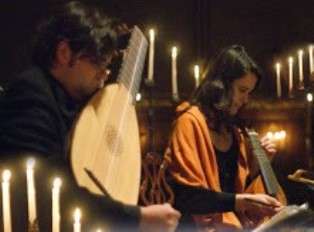|
Back
Dowland’s Woes Get Worthy Setting Cincinnati
St. Thomas Episcopal Church, Terrace Park
04/20/2013 -
John Dowland: Lachrimae
Jeremy Dubin (actor)
Catacoustic Consort: Kivie Cahn-Lipman, Julie Jeffrey, Lawrence Lipnik, Annalisa Pappano, Lynn Tetenbaum (violas da gamba), David Walker (lute) 
(Courtesy of Catacoustic Consort)
John Dowland’s Lachrimae, for viol consort and lute, is a collection of dances (pavans, galliards and allemandes) published in London in 1604. Dowland (1563-1626) was court lutenist to Christian IV of Denmark at the time, ample reason, perhaps, for the work’s melancholy tone, since he had formerly sought the same post at the court of Queen Elizabeth and been rejected.
In fact, however, Dowland’s customary affect was melancholy, and he composed one of the era’s most popular songs in just that vein, Flow my tears, whose opening motif became the basis for Lachrimae. Cincinnati’s early music ensemble Catacoustic Consort closed its 2012-2013 season with Lachrimae and it was more than just a performance. It was an event. The concert took place at St. Thomas Episcopal Church, a century-old parish in the northern suburbs of Cincinnati, under circumstances calculated to turn back the clock. The church was illumined by candlelight (aided, for safety’s sake, by subdued electric lighting) and the acoustic was the stone walls of the church. A capacity crowd was in attendance, spilling over into the balcony. It was quite a sight with the viols (treble to bass) and lute arrayed at the head of the nave, lit by candelabra. Players came from as far as San Francisco (Julie Jeffrey and Lynn Tetenbaum) and New York City (Lawrence Lipnik) to participate in the event.
Lachrimae, subtitled “seaven teares figured in seaven passionate pavans, with divers other pavans, galliards and allemands, set forth for lute, viols, or violons, in five parts,” comprises seven pavans (the Lachrimae). Catacoustic paired each with one of the “divers other” dances in the set, each named for a personage of the time, including Robert Devereux, the second Earl of Essex (favorite of Queen Elizabeth, later executed for treason), the Danish king himself and even a pirate, Captain Digorie Piper. These offered a welcome contrast to the prevailing sorrow of the Lachrimae proper.
Giving the program even greater ambience were readings of Elizabethan poetry by actor Jeremy Dubin of the Cincinnati Shakespeare Company. There was Shakespeare, of course, also Christopher Marlowe, Thomas Wilson, Thomas Wyatt and John Donne. Many of the verses dealt with unrequited or ill-fated love. Translations of Roman poet Ovid, Amores, Book III, Elegy III, preceded the first two pavans, Lachrimae Antiquae (“Old Tears”) and Lachrimae Antiquae Novae (“Old Tears Renewed”). The poet’s lamentations over a faithless girl were echoed plangently by the consort, led by Catacoustic artistic director Annalisa Pappano on treble viol. The King of Denmark’s Galliard and The Earle of Essex Galliard, which followed, were quite jolly by comparison.
Shakespeare’s Sonnet VIII, “Music to hear, why hear’st thou music sadly?” preceded Lachrimae Gementes (“Singing Tears”) and M. Nicholas Gryffith his Galliard, both of which received precise and nuanced renditions by the consort. Actor Dubin, who spoke from the pulpit, introduced Lachrimae Tristes (“Sad Tears”) with Thomas Wilson’s “The Teares of Fancie, or Love Disdained”. The poet’s capitulation - “I to tyrannizing love must yield me” - seemed the perfect setup for the cheerful galliard that followed, Sir John Souch his Galliard. Similarly, poet Thomas Wyatt’s “Farewell Love” (“go trouble younger hearts”) seemed a fitting sentiment for Lachrimae Coactae (“Forced Tears”) and M. Giles Hobies Galliard, which, with a break for intermission, brought a temporary respite from all the weeping.
Lutenist David Walker (of Bellarmine University in Louisville, Kentucky) began the second half with an exquisite performance of Semper Dowland semper dolens, the composer’s punning acknowledgement of his “doleful” nature. Dubin was back on board with John Donne’s “A Valediction: Forbidding Mourning”, introducing Lachrimae Amantis (“Lover’s Tears”), whose far-reaching harmonies evinced genuine suffering. Poetry and music were reversed for Lachrimae Verae (“True Tears”), which set the scene for Dubin’s reading of Donne’s A Valediction of Weeping. The consort responded with M. Buctons Galliard, and as if to say “no more tears,” brought the evening to a close with Mr. John Langston’s Pavan, followed by Mistress Nichol’s Almand and M. George Whitehead his Almand, which out rang bright and optimistic in the darkened church.
Mary Ellyn Hutton
|